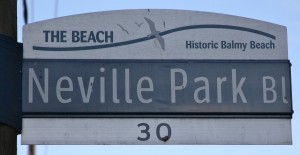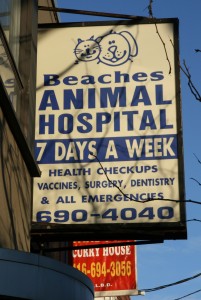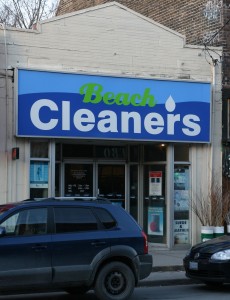A slightly abbreviated version of this story ran on Feb. 4, 2006, in The Globe and Mail. Singularists prevailed in the online poll weeks later, the new street signs were installed without protest and the Beaches BIA changed its name to The Beach BIA. Sandra Bussin was defeated as city councillor in 2010 and Glenn Cochrane died in June 2012. I was raised in the area but won’t have a firm opinion until I see better evidence.
By STEPHEN WICKENS
Toronto’s budgetary shortfall looks impossible, there’s no end in sight for gun violence or poverty, and no imminent start dates for long-discussed waterfront and transit proposals.
So maybe we should have known it was too good to be true when word leaked out of old Toronto’s east end last month that the seemingly interminable and sometimes nasty Beach vs. Beaches fight was finally over.
“It’s going to be ‘the Beach’ — not ‘the Beaches,'” Neil Macdonald said with conviction on Monday about the wording of new street signs planned for the lampposts of Queen Street East between Lockwood Road and Neville Park Boulevard this summer.
“Personally, historically, I think it’s more accurate to call this ‘the Beaches,’ but this time we’re taking the path of least resistance,” said Mr. Macdonald, chairman of the Beaches Business Improvement Area. “The [Beach] singular crowd are the most militant, while the ones who call it ‘the Beaches’ don’t seem to care too much.”
Maybe Mr. Macdonald underestimated the passion of the pluralists — by Thursday, the BIA’s landmark decision was rescinded and the odds of peace in our time appeared as slim as ever. If anything, the war is in danger of serious escalation in the coming weeks as the BIA prepares its website for a little community consultation.
“Well, here we go again,” former CFTO-TV reporter and long-time Beacher Glenn Cochrane said with a loud laugh when told that Mr. Macdonald believes that the impending cyber-battle will provide “a definitive one or the other, a final choice” — maybe within a month.
As far as anyone can tell, Beach/Beaches hostilities go back at least 50 years, and in that time neither side has produced the arsenal of evidence needed to settle matters once and for all. Hard-line Beach types have long tolerated names such as the Beaches Lions and the Beaches Library (where it’s Beaches in stone on the 1916 branch building). They have also embraced the Beaches International Jazz Festival, and haven’t been overly vocal about the relatively recent naming of the political riding, Beaches-East York.
Street signs are something else.
Locals on both sides of the issue haven’t forgotten August 1985, when blue and white signs proclaiming “The Beaches” appeared between Hammersmith and Bellefair Avenues. Anger erupted within hours, but it took until October for the Beach faction to get the city to remove them.
“It was ugly,” said Gene Domagala, who was on the city’s historical board at the time. “I was called in by the mayor [Art Eggleton] along with both city councillors [the late-Dorothy Thomas and Tom Jakobek].
“The media got involved. There were hundreds of letters. A lot of people turned nasty,” Mr. Domagala remembered. “The old-timers said only outsiders and newcomers would ever say ‘the Beaches.’ They were livid that the Queen Street businessmen [who were behind the initiative] hadn’t consulted residents.”
Mr. Domagala, a fount of local historical knowledge, tends to say “the Beach” in casual conversation, but he doesn’t try to tell others what to say. He liked the decision that the BIA has now rescinded, but said, “We’ll never placate everyone.”
At the height of the battle in 1985, long-time resident Mary Campbell told a Toronto newspaper that even though many people say the Beaches, “It’s always been the Beach . . . This [the Beaches signs] only feeds the error.”
Ms. Campbell, whose views haven’t changed, is president of the local historical society. She says her parents, who came to the area before the 1920s, always said “the Beach.” Early in the week she was pleased upon learning the BIA plan: “The Beach” at the top of the new signs with a designation on the bottom of each for one of the area’s four beaches — Balmy, Scarboro, Kew and Woodbine.
But she’s upset with the new BIA plan not because she’s against choice or consultation, but because she thinks a Web poll will be unfair.
 “I don’t have Internet, and that’s probably true for other older people who know the truth,” Ms. Campbell said. “Maybe it’s time to organize and find out who else won’t take this lying down,” she said, adding that a possibly acceptable compromise would be Queen Street signs for the Balmy, Scarboro, Kew and Woodbine beaches that drop “the Beach” and “the Beaches” altogether.
“I don’t have Internet, and that’s probably true for other older people who know the truth,” Ms. Campbell said. “Maybe it’s time to organize and find out who else won’t take this lying down,” she said, adding that a possibly acceptable compromise would be Queen Street signs for the Balmy, Scarboro, Kew and Woodbine beaches that drop “the Beach” and “the Beaches” altogether.
Of course, the fact the area once had four distinct beaches is used by pluralists to argue that “the Beach” is an illogical term. They also say that “the Beaches” has a long history of common usage. Singularists counter that “the Beach” is just as logical because it has been one community since the four neighbourhoods merged.
And round it goes.
Mr. Cochrane doesn’t take sides, but he correctly predicted early in the week that the BIA would find it had foolishly jumped the gun by not consulting residents first.
“There could be a severe chastising this time too,” said Mr. Cochrane, who moved to the area 40 years ago and writes a column called Beach(es) Beat for a local weekly. He doesn’t think a similarly diplomatic use of parentheses would work on street signs.
He also sees danger in consultation because Beachers can’t agree on neighbourhood boundaries. “Will someone’s opinion count if they live north of Kingston Road? Real estate agents have long had a very flexible view of what they can sell as the Beach.”
There are two things that nearly everybody in the area can agree on: The older the Beacher the more likely he is to be a singularist, and that the views tend to be passed down through families. And an informal poll taken this week outside two neighbourhood institutions — the Garden Gate restaurant and the Beaches Library — showed both sides fairly evenly split. When asked which name they prefer, 24 residents said “the Beaches,” 19 said “the Beach,” while four were undecided and two abstained.
One of the abstainers noted that he has lived in the area since the 1930s and hates the Beach/Beaches debate because it always turns to pejorative talk about outsiders and newcomers. He said that in his youth, it was Catholic-hating Orange Lodge members who insisted on Beach rather than Beaches.
So perhaps a compromise is in order: Might alternating Beach and Beaches on every other post work?
 Not in the opinion of the local city councillor, Sandra Bussin, who also refuses to state her preference. Ms. Bussin, who says she doesn’t believe a Beach/Beaches battle will become an election issue, said the citywide replacement program in the area is on hold until matters are settled.
Not in the opinion of the local city councillor, Sandra Bussin, who also refuses to state her preference. Ms. Bussin, who says she doesn’t believe a Beach/Beaches battle will become an election issue, said the citywide replacement program in the area is on hold until matters are settled.
Mr. Macdonald says it will now be fall at the earliest before new signs — however they are labelled — are up.
Meanwhile, some Beachers, like Hugh Cooper, just can’t take the debate seriously.
“The Beach? Wasn’t that Kramer’s cologne on Seinfeld?” he asks with a laugh. “It would be just like this neighbourhood to have it out again. It’s a great place to live, but it would be better if people took stuff like litter more seriously, or if they put their energy into helping seniors or Cubs and Brownies.”
